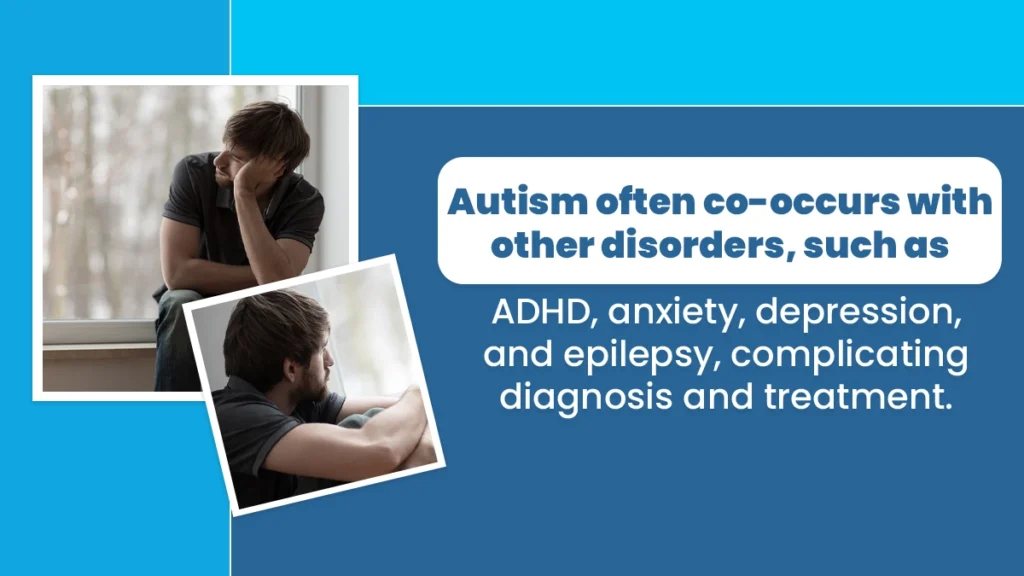Autism, a complex neurodevelopmental condition, often co-exists with other disorders such as ADHD, anxiety, and epilepsy. These co-occurring conditions can complicate diagnosis and treatment, creating unique challenges for individuals and their families.
Understanding the interconnected nature of autism and its co-occurring disorders is crucial. Read on to gain valuable insights into how these conditions interact and explore effective management strategies.
Key Takeaways
Autism often co-occurs with other disorders, complicating diagnosis and treatment but highlighting the need for comprehensive care. Continue reading!
- Numerous factors contribute to the occurrence of autism spectrum disorder (ASD) and co-occurring disorders.
- Timely diagnosis and assessment are vital for effective intervention for individuals with autism and co-occurring disorders.
- Various treatment options and effective management strategies help to manage autism and co-occurring disorders.
The Haven Detox-Little Rock offers extensive services to treat various mental health conditions. Call us at (501) 271-3342 to get details of our services.

Overview Of Autism And Co-Occurring Disorders
Autism, or Autism Spectrum Disorder (ASD), is a developmental condition. It affects how people communicate and interact with others. Common symptoms of autism often include difficulty with social skills, repetitive behaviors, and speech challenges. ASD can vary widely in severity and symptoms.
Many people with autism have other co-occurring mental health conditions. These include mood disorders, anxiety, bipolar disorder, and depression. Other common issues are sleep disorders and epilepsy. These conditions can make daily life more challenging for individuals with autism.
Autism and co-occurring mental health disorders often influence each other. Managing one condition can improve the other. For instance, treating social anxiety can help reduce autism symptoms. Understanding this link is crucial for effective treatment and support.
Common Co-Occurring Disorders
Co-occurring disorders are medical conditions that often appear alongside primary mental health issues. Autism usually co-exists with other disorders. These disorders can complicate accurate diagnosis and treatment, making recovery more challenging. Understanding the most common co-occurring conditions is essential for providing comprehensive care.
Attention-Deficit Hyperactivity Disorder (ADHD)
Autistic children often have ADHD. They may struggle to focus or stay still. This can make learning and social interactions difficult. Symptoms of ADHD can overlap with autism traits. Medication and behavioral therapies can be effective treatments.
Anxiety Disorders
Many autistic individuals experience anxiety. They may feel nervous in social situations. Changes in routine can increase their anxiety. Managing stress can improve their quality of life. Therapy and medication can help reduce anxiety symptoms.
Depression
Depression is common in those with autism. They might feel sad or lose interest in activities. Social isolation can worsen depression. Early intervention can help manage depressive symptoms. Support from family and friends is crucial.
Obsessive-Compulsive Disorder (OCD)
OCD often appears in autistic people. They may have repetitive thoughts and behaviors. This can interfere with daily activities. Treating OCD can reduce stress and improve functioning. Cognitive-behavioral therapy is a common treatment.
Learning Disabilities
Learning or intellectual disabilities frequently occur with autism. They can affect reading, writing, and math skills. Customized teaching methods can help. Early support improves academic success. Special education services can provide additional assistance.
Language And Communication Disorders
Autism often includes communication challenges. Some may struggle to speak or understand language, hindering social interaction. Speech therapy can improve communication skills, and technology can also aid communication.
Sensory Processing Disorder
Sensory issues are common in autism. Individuals may be sensitive to sounds, lights, or textures, which can cause discomfort and anxiety. Sensory integration therapy can help manage these sensitivities; occupational therapy is another beneficial approach.
Gastrointestinal Issues
Many autistic individuals have digestive or GI problems. They might experience stomach pain or constipation. These issues can affect their overall health. Dietary changes and medical treatment can help. Regular medical check-ups are essential.
Sleep Disorders
Chronic sleep problems are prevalent in autism. Individuals facing sleep disturbances may have trouble falling or staying asleep, and poor sleep can affect mood and behavior. Good sleep habits and treatments can improve sleep quality.
Risk Factors And Causes
Autism and related co-occurring disorders result from a complex mix of factors. Understanding the causes can help in early diagnosis and intervention. These factors include genetic, environmental, and neurobiological influences. Each plays a role in how autism develops, affecting patients individually.
Genetic Factors
Genetic factors play a significant role in autism and related disorders. Researchers have found specific genes linked to autism. These genes can affect brain development and function. Sometimes, autism runs in families, showing a hereditary pattern.
Environmental Influences
Environmental influences also contribute to autism risk. Exposure to certain chemicals during pregnancy can increase the risk. Factors like parental age at conception may impact autism likelihood. It’s essential to minimize harmful exposures during pregnancy.
Neurobiological Factors
Neurobiological factors affect brain structure and function in autism. Differences in brain connectivity are often observed. Abnormal brain growth during early childhood is expected. These changes can influence behavior, communication, and social skills.
Diagnosis And Assessment
Diagnosing autism involves detailed assessments by specialists. Studies show that early detection is crucial for effective intervention. The National Institute of Mental Health provides resources to help with the diagnostic process. Additionally, the Office of National Autism Coordination offers guidance on managing co-occurring disorders.
Screening For Autism
Screening for autism helps identify developmental delays early. General population studies recommend routine screenings for young children, and the Autism Research Institute provides tools to aid in screening. Early screening can prevent problematic behaviors from becoming severe.
Identifying Co-Occurring Disorders
Identifying co-occurring disorders is essential for comprehensive care. Many children with autism have additional challenges like ADHD or anxiety. Professionals use specific criteria to diagnose these issues. Proper identification helps in creating effective treatment plans.
Diagnostic Tools And Techniques
Diagnostic tools and techniques include interviews, observations, and standardized tests. These methods help identify autism and other developmental delays. Resources from the National Institute of Mental Health support these techniques. Accurate diagnosis leads to better-targeted interventions and support.
Treatment And Management Strategies
Autism and co-occurring disorders require comprehensive treatment and management strategies. These strategies involve various approaches to address individuals’ unique needs. Effective treatment often combines behavioral interventions, medication, and therapeutic support. The goal is to improve quality of life and foster independence through personalized care plans.
Integrated Treatment Approaches
Healthcare providers use integrated treatment to address autism and other disorders together. They combine therapies to create a comprehensive plan. This approach helps doctors tailor treatments to individual needs. It includes lifestyle changes and self-care routines.
Behavioral Interventions
Behavioral interventions help develop new skills and manage behaviors. Doctors often use cognitive behavioral therapy to teach coping strategies. These interventions aim to improve daily functioning. They are crucial for adapting to social and environmental changes.
Medication Management
Doctors prescribe medications to manage symptoms of autism and co-occurring disorders. Medication can reduce anxiety and improve focus. It’s often used in addition to other therapies. Healthcare providers monitor and adjust dosages as needed.
Therapeutic Support
Therapeutic support includes occupational, speech, and physical therapies. These therapies help develop essential life skills. Healthcare providers focus on improving communication and physical abilities and teaching self-care techniques to enhance independence.
Support Systems And Resources
Accessing support systems and resources is crucial for the well-being of individuals with autism and co-occurring disorders. Many communities offer specialized programs tailored to their unique needs. These may include therapy sessions, educational workshops, and social skills training. These resources aim to enhance communication abilities, improve social interactions, and develop essential life skills.
Furthermore, support groups provide a platform for individuals and families to connect with others facing similar challenges. These groups offer a sense of belonging and understanding, reducing feelings of isolation and stigma. Additionally, online forums and helplines provide immediate assistance and guidance for individuals seeking information or support.
Moreover, educational institutions play a vital role in accommodating the needs of students with autism and co-occurring disorders. Special education programs offer tailored curricula and extra support, fostering academic success and personal growth. Furthermore, trained professionals like behavioral therapists provide tailored interventions to address specific challenges and promote overall well-being.
Frequently Asked Questions (FAQs)
What are common co-occurring disorders with autism?
Autism often comes with other issues like anxiety, ADHD, and depression. Anxiety makes you worry a lot about different things, while ADHD makes it hard to focus and control your actions. Depression affects your mood and can make you feel sad or unmotivated. Sensory processing disorder can make you super sensitive to light or sound.
Epilepsy, a condition causing seizures, is more common in people with autism. Some might also have trouble with their thinking abilities, which we call intellectual disabilities. Language problems, like trouble speaking or understanding others, are common in autism.
How are co-occurring disorders diagnosed in individuals with autism?
Diagnosing co-occurring disorders in individuals with autism involves evaluating symptoms through interviews and observations. Specialists like psychologists and psychiatrists work together to ensure accurate diagnosis. They look for signs of conditions like anxiety or depression alongside autism traits, sometimes using standardized tests.
Treatment plans are then tailored to address autism and co-occurring disorders effectively. Regular monitoring tracks progress and allows for adjustments in interventions as needed. This comprehensive approach supports individuals in managing multiple conditions and improving their overall well-being, ensuring that their needs are met holistically for better long-term outcomes.
What treatment options are available for managing co-occurring disorders in autistic individuals?
To manage co-occurring disorders in autistic individuals, various treatments are available. Therapy and medication are standard options. Cognitive Behavioral Therapy (CBT) helps with anxiety and depression often seen in autism. Social skills training teaches better interaction. Medications like SSRIs can ease mood disorders.
Occupational therapy assists in daily tasks and sensory processing. Speech therapy improves communication challenges. Family therapy provides support and understanding. Individualized plans cater to specific needs. Early intervention is vital for better results. Collaborative care with professionals ensures comprehensive support. By tailoring treatment, we can optimize outcomes and promote overall well-being.
Find Support At The Haven Detox-Little Rock
Are you ready to explore comprehensive care for autism and co-occurring disorders? Contact The Haven Detox-Little Rock for guidance.
Our facility offers various mental health services to meet your unique needs and circumstances. Through a combination of therapy, medication-assisted treatment, and peer support, individuals struggling with mental health issues can learn to manage their condition.
We offer NAD IV therapy, a revitalizing treatment that replenishes your body with vital nutrients, promoting a smoother recovery process and enhancing overall health.
Call (501) 271-3342 to discover how our extensive services can support you or your loved one on the path to wellness.




